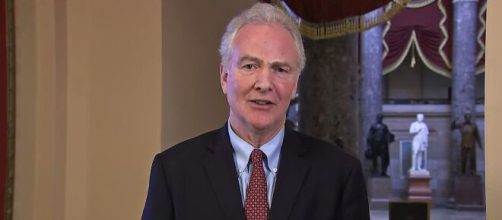Responding to U.S. House Speaker Nancy Pelosi's visit to Taiwan by firing missiles into the waters of Japan's exclusive economic zone "is going to backfire on China," said Senator Chris Van Hollen.
Van Hollen, a member of the Senate Foreign Relations Committee, appeared on the August 7 broadcast of NBC's "Meet the Press." Beijing's military demonstration might lead Japan to beef up "its defense spending and seek even closer military engagement and cooperation with the United States," said the Maryland Democrat.
'Saber-rattling' and 'chest-bumping.'
Van Hollen accused Chinese President Xi Jinping of deciding to "manufacture a crisis over Pelosi's visit." Xi was indulging in "saber-rattling" and "chest-bumping" ahead of this year's 20th National Congress of the Chinese Communist Party (CCP), said the senator. At the congress, said Van Hollen, Xi was expected to seek a third term as the country's leader.
WATCH: Sen. @ChrisVanHollen (D-Md.) member of the Senate Foreign Relations Committee, says House Speaker Nancy Pelosi's trip to Taiwan was worth it, despite the fallout.
"What President Xi decided to do was manufacture a crisis. ... This is saber rattling, and chest-thumping." pic.twitter.com/up9BYbWJA8
— Meet the Press (@MeetThePress) August 7, 2022'China doesn't get to dictate'
The senator said the trip by Pelosi, a fellow member of the Democratic Party, had been worthwhile.
He said it was important to show "that China doesn't get to dictate" which Americans could visit Taiwan. The American government had not abandoned the One China Policy, but it opposed the forced reunification of the self-governing island with China, said Van Hollen.
Making Taiwan stronger
An invasion of Taiwan was not inevitable, the senator said. He said the United States had to continue strengthening Taiwan's ability to deter Chinese aggression. Russian President Vladimir Putin had expected an easy conquest of Kyiv. Still, the war in Ukraine had shown the world how effectively a free people could resist subjugation by a larger country, he added.
On August 7, The New York Times reported that the military exercises, which had included the firing of the missiles, were expected to end later that day.
The flexing of muscle might dissuade other Western leaders from visiting the island, but it might also have diminished any hopes of reaching a peaceful reconciliation between Taiwan and the CCP, the paper said.
Former Australian Prime Minister Kevin Rudd quoted the paper as saying the show of force had increased "the overall probability of crisis, conflict or even war" between China and the United States. Suppose the CCP succeeded in influencing Taiwan's 2024 presidential elections. In that case, the island might again be offered peaceful incentives to accept a "one country, two systems" path to unification with the mainland, the paper said.
The paper quoted Zhou Yezhong, a professor of law at Wuhan University, saying the island would be much harder for Beijing to govern than Hong Kong. The academic went on to say the islanders would need to be "re-Sinified" in order for them to be receptive to China's official values.


